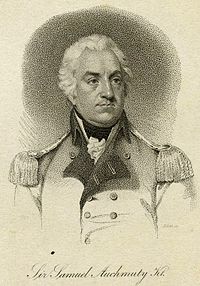Samuel Auchmuty (general)
| Sir Samuel Auchmuty | |
|---|---|

Sir Samuel Auchmuty
|
|
| Born | 1756 New York City |
| Died | 1822 (aged 65–66) |
| Allegiance |
|
| Service/branch |
|
| Rank | Lieutenant General |
| Commands held |
Madras Army Ireland |
| Battles/wars | |
| Awards | Knight Grand Cross of the Order of the Bath |
Lieutenant General Sir Samuel Auchmuty, GCB (1756–1822) was a British Army general.
Sir Samuel's grandfather, Robert Auchmuty (d. 1750), was descended from a family settled in Fife, Scotland, in the 14th century. Robert Auchmuty's father (Sir Samuel's great grandfather) had moved to Ireland in 1699, and Robert emigrated to America and settled in Boston, where he practised law with success. Robert Auchmuty was appointed to the court of admiralty in 1703, which office he resigned shortly afterward; but he was reappointed in 1733. He was in England in 1741 as agent for the colony, and in that year published in London a pamphlet entitled The Importance of Cape Breton to the British Nation, and a Plan for Taking the Place.
Sir Samuel's father, also named Samuel (January 16, 1722 Boston - March 6, 1777 New York City), was a clergyman. He graduated from Harvard in 1742, studied theology in England, and was appointed assistant minister of Trinity Church in New York. In 1764 he became rector, and had charge of all the churches in the city. He continued to read prayers for the king during the American Revolutionary War, until Lord Stirling, in command at New York, compelled him to desist; whereupon he locked the churches and withdrew to New Jersey, ordering that no services should be held until the prayers could be read without abridgment. When the British captured New York he passed the American lines amid great hardships. He found his church and parsonage burned and the church records destroyed. The exposure that he underwent in order to evade the American sentries caused his death.
Sir Samuel was born at New York City in 1756, and educated at King's College, the progenitor of today's Columbia University, where he graduated in 1775. A loyalist, during the American War of Independence he was given an ensigncy in the loyal army in 1777, and in 1778 a lieutenancy in the 45th Foot, without purchase. When his regiment returned to England after the war, having neither private means nor influence, he exchanged into the 52nd (Oxfordshire) Regiment of Foot, in order to proceed to India.
...
Wikipedia
